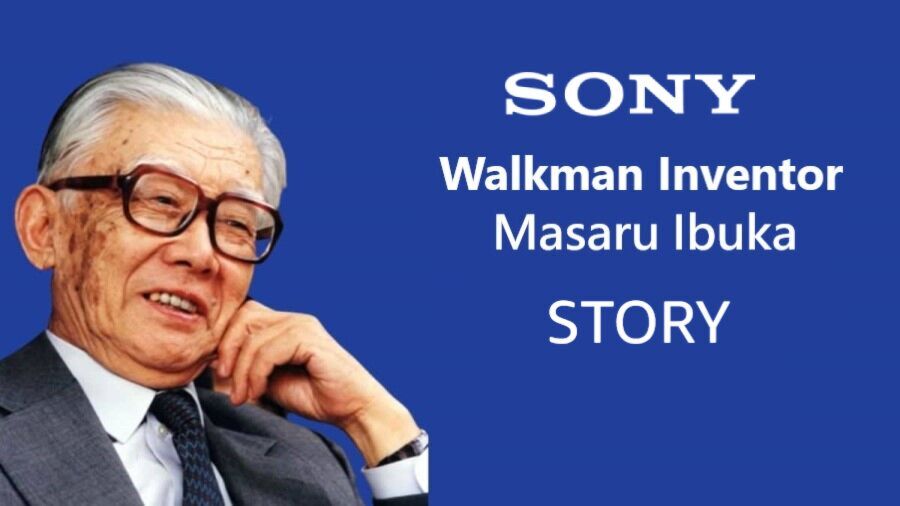Local Storage seems to be disabled in your browser.
For the best experience on our site, be sure to turn on Local Storage in your browser.
Meet Masaru Ibuka, the Man Responsible for Sony's Impressive Growth

Masaru Ibuka the Man who Caused Sony's Company Growth
Masaru Ibuka (11 April 1908 – 19 December 1997) was a Japanese engineer, inventor, and businessman. He is best known as the co-founder of Sony Corporation, along with Akio Morita.
Ibuka was born in Nikko, Tochigi Prefecture, Japan. He studied electrical engineering at Waseda University and graduated in 1933. After graduation, he worked for a number of companies in the telecommunications industry. In 1946, he founded Tokyo Telecommunications Engineering Corporation (Totsuko) with Morita. Totsuko later became Sony Corporation.
Ibuka was a visionary leader who had a passion for innovation. He was responsible for developing many of Sony's most iconic products, including the transistor radio, the Walkman, and the Trinitron television. He was also a strong advocate for corporate social responsibility and was committed to using Sony's technology to improve the lives of people around the world.
How Masaru Ibuka Invented the Walkman for the First time
Masaru Ibuka, the co-founder of Sony, invented the Walkman in 1979. He was inspired to create the Walkman after he found that the existing portable cassette players were too bulky and inconvenient to use while walking or commuting.

Ibuka asked Kozo Ohsone, the general manager of Sony's Tape Recorder Business Division, to develop a smaller, more portable cassette player. Ohsone and his team worked on the project for several months, and the first Walkman, the TPS-L2, was released in Japan in 1979.
The Walkman was an instant success. It was small, lightweight, and easy to use, and it allowed people to listen to their favorite music on the go. The Walkman quickly became a cultural phenomenon, and it is credited with revolutionizing the way people listen to music.
Here are some of the key factors that contributed to the invention of the Walkman:
- The development of the cassette tape in 1963. The cassette tape was a small, portable, and affordable way to record and playback music.
- The miniaturization of electronics in the 1970s. Advances in electronics made it possible to create smaller and more powerful portable cassette players.
- Ibuka's vision for a portable music player. Ibuka had a vision for a portable music player that would allow people to listen to their favorite music on the go.
The Walkman was a groundbreaking invention that changed the way people listen to music. It is a testament to Ibuka's vision and innovation that the Walkman is still popular today, more than 40 years after its introduction.
How Masaru Ibuka Succeeded to Make the Walkman
Masaru Ibuka succeeded in making the Walkman by combining his vision for a portable music player with the latest advances in electronics. He also had the foresight to see the potential of the cassette tape as a portable music format.
Here are some of the key factors that contributed to Ibuka's success in making the Walkman:
- His vision for a portable music player. Ibuka had a vision for a portable music player that would allow people to listen to their favorite music on the go. He saw the potential of the cassette tape as a portable music format, and he was determined to create a product that would make it possible for people to enjoy their music wherever they were.
- The latest advances in electronics. The development of miniaturized electronics in the 1970s made it possible to create a portable music player that was small, lightweight, and affordable. Ibuka was able to take advantage of these advances to create the Walkman.
- The right team. Ibuka assembled a team of talented engineers and designers who were passionate about creating a new kind of portable music player. This team worked tirelessly to develop the Walkman, and they were ultimately successful in creating a product that changed the way people listen to music.
The Walkman was a groundbreaking invention that changed the way people listen to music. It is a testament to Ibuka's vision and innovation that the Walkman is still popular today, more than 40 years after its introduction.
Here are some additional details about how Ibuka succeeded in making the Walkman:
- He was willing to take risks. Ibuka knew that the Walkman was a new and untested product, but he was willing to take the risk of bringing it to market. He believed that the potential benefits of the Walkman outweighed the risks.
- He was persistent. Ibuka didn't give up on the Walkman even when it faced challenges. He continued to work with his team to improve the product, and he eventually succeeded in making it a success.
- He was a great leader. Ibuka was able to motivate and inspire his team to achieve great things. He created a positive and supportive work environment, and he encouraged his team to take risks and think outside the box.
The Walkman is a testament to Ibuka's vision, innovation, and leadership. It is a product that has changed the way people listen to music, and it is a reminder of the power of human ingenuity.
The role Masaru Ibuka played in the development of Sony
Masaru Ibuka was a visionary leader who had a passion for innovation. He was responsible for developing many of Sony's most iconic products, including the transistor radio, the Walkman, and the Trinitron television. He was also a strong advocate for corporate social responsibility and was committed to using Sony's technology to improve the lives of people around the world.
Ibuka's contributions to Sony's growth can be summarized as follows:
- He had a clear vision for the company. Ibuka believed that Sony should be a company that creates innovative products that improve people's lives. He was always looking for new ways to apply technology to solve problems.
- He was a risk-taker. Ibuka was not afraid to take risks on new products. He knew that innovation often requires taking risks, and he was willing to do so in order to bring new products to market.
- He was a great leader. Ibuka was able to motivate and inspire his team to achieve great things. He created a positive and supportive work environment, and he encouraged his team to take risks and think outside the box.
- He was a pioneer in the electronics industry. Ibuka was one of the first people to see the potential of transistors and other new technologies. He was able to use these technologies to create innovative products that helped Sony to become a leader in the electronics industry.
Ibuka's contributions to Sony's growth are undeniable. He was a visionary leader who had a passion for innovation. He helped to create Sony as the company that it is today, and his legacy will continue to inspire people for many years to come.
Here are some specific examples of how Ibuka's vision and leadership helped Sony to grow:
- In the early days of Sony, Ibuka saw the potential of transistors to revolutionize the electronics industry. He convinced Sony to invest in transistor technology, and this investment helped Sony to become a leader in the transistor radio market.
- In the 1970s, Ibuka had the vision to create a portable music player that would allow people to listen to their favorite music on the go. This vision led to the development of the Walkman, which became one of Sony's most iconic products and helped to make the company a global leader in the consumer electronics market.
- In the 1980s, Ibuka was instrumental in the development of the Trinitron television, which was a breakthrough product that offered superior picture quality to other televisions on the market. The Trinitron television helped Sony to become a leader in the television market, and it is still one of the most popular television brands in the world today.
Ibuka's contributions to Sony's growth are immense. He was a visionary leader who had a passion for innovation. He helped to create Sony as the company that it is today, and his legacy will continue to inspire people for many years to come.
















Comments